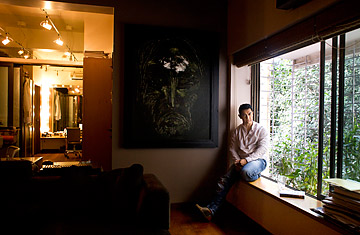
Portrait of Aamir Khan at his residence in Pali Hills, Mumbai, June 8, 2012
(4 of 4)
But Khan's early career gave little inkling of a socially conscious streak. After his breakthrough role as Raj in Qayamat Se Qayamat Tak, he was quickly typecast as a romantic lead and delivered a string of hits through the 1990s. He began to vary his roles with Lagaan in 2001, about a cricket match between British colonialists and impoverished Indian villagers. Nominated for the Academy Award for Best Foreign Language Film, Lagaan was a spur for higher-quality work, including his 2007 directorial debut Taare Zameen Par (Stars on Earth), a critically acclaimed exploration of dyslexia, a condition the Indian school system barely recognizes. While 3 Idiots is principally a comedy, it too is a commentary on India's education system, taking aim at the tradition of rote learning, especially in universities.
Khan was finally ready with an idea for a TV show, but it would take him two years to develop Satyamev Jayate. From the beginning, says director Hirani, "he was determined that it would be completely different from anything anybody had tried on TV." Though the show was bankrolled by Star India, the country's biggest cable network, owned by Rupert Murdoch's News Corp., Khan agreed to do it only if it was simultaneously broadcast by the state-owned terrestrial station. His star power ensured that Star went along with other conditions too: the program, shot in Hindi, would have to be dubbed or subtitled in several Indian languages; there would also be tie-ins with radio shows and a weekly column in major newspapers. Khan says the full-court press is designed to "force you to pay attention to the issues we were covering, wherever you were in India."
He insisted the show air on Sunday mornings, at 11, traditionally a "dead" time for popular television. "I didn't want prime time," Khan says. "I wanted people to make an investment: you have to decide you want to watch." He calculated that as viewers sat to Sunday lunch with their families after the show, they would discuss what they had just seen. "It's not enough to shock and shake," he says. "It's important to start conversations." Khan also had conditions for the show's sponsors. Airtel, a cell-phone company, and Axis Bank agreed to be the conduits for any donations the audience would make to the causes being examined, and a major Indian charity agreed to match all the contributions.
Reality Check
The themes for the 13 episodes were chosen after weeks of brainstorming with a team of scouts, reporters and producers. Once shooting began, bringing Khan into contact with the victims of social problems the team had identified, it began to get very real. Listening to their stories was more emotionally exhausting than he had expected. "It left me very brittle," he says. "I'm not trained for this, to be sitting two feet from someone, having them pour their heart to you."
Even allowing for Khan's marketability, the show was not a sure thing. It was impossible to know if Indians would tune in on a Sunday morning to be hectored for 90 minutes on subjects they had previously preferred to sweep under the carpet. The decision to open the series on the subject of female feticide was risky too: the stories of women forced by their families to get rid of their unborn daughters were gut-wrenching. "We knew we had strong material, but we couldn't be sure how long people would watch before deciding they'd had enough of the horror and turn to a comedy or a cooking show," Khan says. Yet the first episode was watched by 90 million people.
The program's success has led, inevitably, to questions about a second season. Khan says he's interested, but wants first to take some time to assess the impact of the first series. It will be hard to top. There are tough subjects left to tackle, and they will likely offend more than a doctors' association. "How far does [Khan] want to go?" asks Kashyap, the director. "Will he tackle the taboos even Bollywood doesn't dare touch?" These, Kashyap says, include direct criticism of politicians or parties, discussion of sexuality and questioning the tenets of religion. Khan says he won't think about new themes just yet, but rules one out outright: "My interest is in the corruption in each of us, not just in politicians." Whatever Khan chooses to do next in his quest for grace, there's a good chance it will lift India a little closer to what he — and fellow Indians — would wish their country and society to be.
